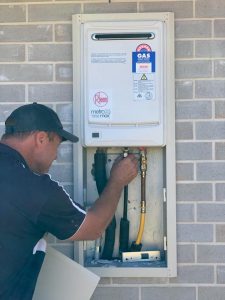Dealing with the Standard Water Heater Crisis Scenarios
Dealing with the Standard Water Heater Crisis Scenarios
Blog Article
Listed here down the page you might get lots of wonderful guidance in relation to Is Your Water Heater Leaking?.

A hot water heater is among one of the most important basic home appliances that can be located in a home. With water heaters, you do not require to go through the stress of home heating water manually each time there is a requirement to wash, do the laundry, or the dishes. There is always a possibility that your water heating unit would act up as with a lot of mechanical tools.
It is essential to note any type of little breakdown and tackle it rapidly before things get out of hand. Many times, your water heater starts to malfunction when there is a build-up of sediments as a result of continual usage. As a preventative measure, regular flushing of your hot water heater is suggested to prevent sediment buildup and also protect against functional failing.
Typical water heater emergencies and how to deal with them
Insufficient warm water
Dealing with an inadequate supply of hot water can be frustrating. It may be that the hot water heater can't support the hot water demand for your house. To handle this trouble, you could attempt to adjust your heating unit's temperature level dial and wait for a few mins. If the trouble continues, you can request for the help of an expert plumber. Alternatively, you can update your water heater to one with a larger ability.
Changing water temperature.
Your hot water heater could start producing water of different temperature levels typically ice scalding or chilly warm. In this scenario, the first thing you do is to make sure that the temperature level is set to the preferred level. If after doing this, the water temperature level keeps altering during showers or various other tasks, you might have a malfunctioning thermostat. There could be a need to replace either the thermostat or the heating device of your water heater.
Leaky hot water heater storage tank.
In this scenario, you need to transform off your water heating system, enable it to cool down, as well as thoroughly look for the source of the problem. At times, all you require to do is to tighten up a couple of screws or pipe connections in situations of small leakages. If this does not function and the leakage continues, you might require to employ the services of a service technician for an appropriate replacement.
Tarnished or stinky water
When this occurs, you require to recognize if the issue is from the tank or the water resource. If there is no amusing scent when you run chilly water, after that you are particular that it is your water heating unit that is defective. The smelly water can be created by rust or the buildup of germs or sediments in the water heater tank.
Verdict
Some homeowners overlook little warning and minor faults in their hot water heater system. This only brings about additional damages as well as a possible total breakdown of your device. You ought to manage your water heater mistakes as soon as they come near avoid more expenditures and unneeded emergency problems.
With water heaters, you do not require to go via the tension of home heating water by hand every time there is a demand to take a bath, do the laundry, or the meals. It may be that the water heater can't support the hot water demand for your home. Your water heater might begin creating water of various temperatures typically ice hot or cool warm. If there is no funny scent when you run cold water, then you are particular that it is your water heater that is malfunctioning. The odiferous water can be caused by rust or the build-up of microorganisms or debris in the water heater tank.
Common Water Heater Issues and What You Should Do
What Type of Water Heater Do You Have?
Before we begin it’s first important that you identify the type of water heater you have on your property. There are two main types of water heaters out there: conventional and high efficiency.
Both of these types of products typically use either gas or electricity to heat power. There are also solar water heaters that use a thermal collector on the roof or yard to heat the water.
While these models are not as common, they can cut heating costs in half. In this article, we will focus on conventional and high efficiency.
How Do My Electric and Gas Water Heater Work?
Though they look similar, electric and gas water heaters work very differently. It’s important to know their basic function because often problems can be specific to the heating source.
In the electric model, a thermostat on the side of the machine detects the temperature of the water in the tank. When the temperature needs to rise electricity flows to a heating element suspended in the water.
Gas models also use a thermostat device — typically with a mercury sensor at the tip and an additional sensor called a thermocouple. The thermocouple detects whether the pilot light is on and controls the flow of gas.
When the thermostat drops below the appropriate level gas is released which becomes ignited by the pilot light. The flame heats the bottom of the water tank which causes hot water to rise and cold water to drop.
This natural circulation continues until the water reaches the desired temperature. Then, the thermostat triggers the gas control valve to shut off the flow of gas.
What Are the Most Common Issues and How Do You Fix Them?
https://happyhiller.com/blog/common-water-heater-issues-and-what-you-should-do/

Hopefully you liked our piece on Common Hot Water Heater Problems. Thanks so much for finding the time to browse our article. Loved our content? Please share it. Let others locate it. Many thanks for going through it.
Learn More Report this page